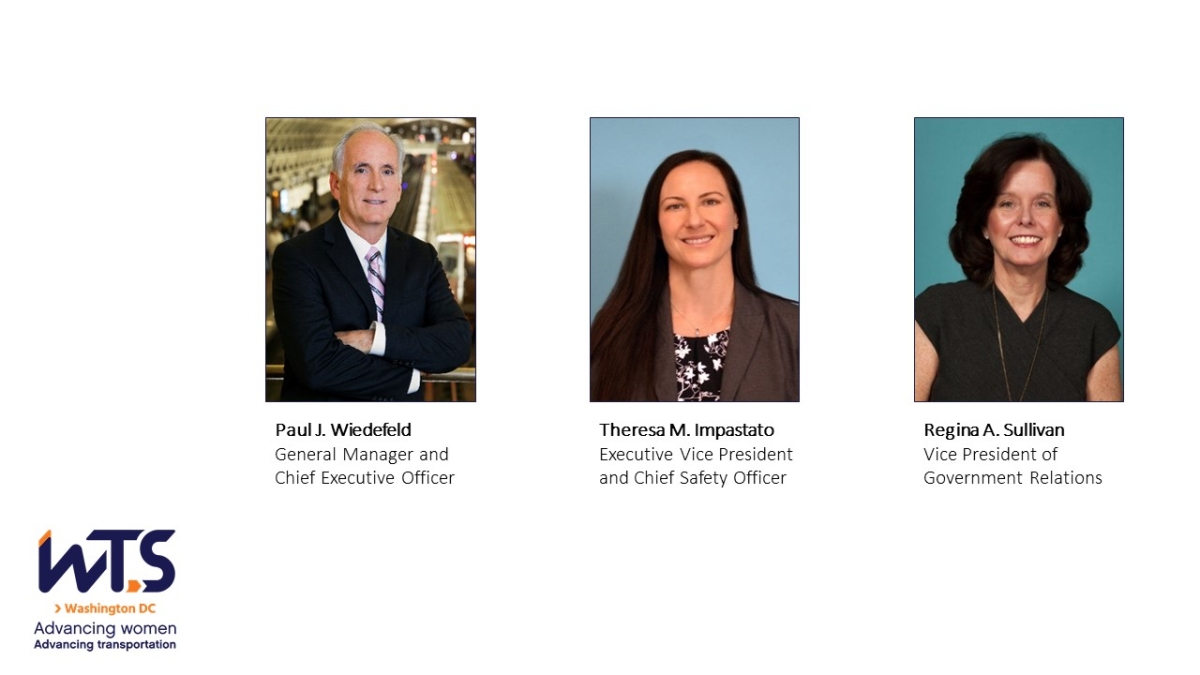WMATA During the Pandemic
By Anne Stubbs, WTS-DC
The WTS-DC annual conversation with WMATA’s leadership had a new date and a new look in 2020: a webinar panel discussion on November 17. WMATA General Manager and CEO, Paul Wiedefeld, discussed “WMATA During the Pandemic” with Executive Vice President and Chief Safety Officer (CSO), Theresa Impastato, and Vice President of Government Relations, Regina Sullivan. Acknowledging WTS’ focus on professional development for women in transportation, Impastato and Sullivan also shared insights from their own careers. Once again, the WMATA event was one of the chapter’s most popular with more than 100 participants who engaged with a variety of questions. In addition to being informative, the event generated almost $1,500 for the WTS-DC Scholarship Fund.

Three themes—strategic and adaptive decision-making, collaboration, and communication—were woven throughout the discussion of WMATA’s readiness and response to the pandemic and the impacts on its priorities, operations and finances, and physical system.
The pandemic focused WMATA’s priorities on the immediate challenges of workforce and customer safety, aligning service with demand especially for essential service and the transit-dependent as well as service equity, while also protecting the system’s future as a transportation and economic asset for the region’s recovery. These challenges were compounded as ridership and revenues plunged and new expenses incurred to provide a safe environment. The realization of a slow regional recovery forced major adjustments to the current (FY2021) budget, as likely ridership projections were adjusted from 150 million to 61 million.
Planning, preparedness, regional partnerships, and communication were central to WMATA’s actions to tackle these challenges. As described by Impastato, WMATA participated as early as January 2020 in regional partnerships to monitor public health and ridership data. It set up a new pandemic task force to draw upon lessons learned from other pandemics. WMATA quickly began securing personal protective equipment (PPE), undertook studies of air filtration systems, and worked with labor unions.
The preparedness planning informed WMATA’s response actions. They included a variety of safety measures consistent with CDC guidance and with science-based assessments: mask mandates for customers and the WMATA workforce, intensive cleaning of equipment and stations, 8-car trains to allow for on-board social distancing, rear-boarding of buses, and contactless payment. WMATA also took specific measures to protect its workforce, including changes in work practices, staggered work times, reconfigured workspace, contact tracing, and encouraging sick workers to use sick leave. Throughout, WMATA sought to keep its board, regional officials, and the public informed of the impacts that it faced and the actions taken.
A similar reliance upon regional collaboration and communication guided steps to deal with the financial fallout of the pandemic. WMATA joined other transit providers and labor unions in this region and across the country to monitor pandemic-related developments and assess the financial implications. It sought public feedback to operating and service changes, and provided factual daily reports to the public as well as state and federal decision-makers. Responses to a public survey on pandemic-related changes in service and operations was fairly favorable, with the caveat that the reductions should not be permanent.
In response to questions from participants, Wiedefeld noted that WMATA is about more than moving people. As part of the larger community, it must consider what is happening there, including concerns for social justice. Among these steps are greater transparency about Metro police activities. WMATA has a panel to review physical altercations and the steps taken by WMATA. It is engaged with the District in a pilot to examine a graduated fare structure for individuals facing greater financial distress. WMATA’s board is very focused on these issues, and WMATA must balance financial stresses of what it wants to do.
Impastato and Sullivan also spoke about the value of unexpected work opportunities that offer risk as well as opportunity for professional growth and career development. Drawing upon her own career path, Impastato emphasized the importance of being open to a prospective job that offers a different work-life experience and culture. Never be afraid to say “yes” to such opportunities, for they can lead to personal and professional growth. Reflecting on her experience in the public and private sector, Sullivan encouraged an openness to public service opportunities. Public service is a calling, and can be educating and rewarding at any level of the job hierarchy.
Thank you to the WMATA panelists and webinar participants. A special thank you to Katie Galbo of WTS-I for invaluable technical support in hosting the webinar; Board Advisor, Brittney Gick, who moderated the question period; and WTS-DC chapter members Katie Masetti and Amber Garnett for providing logistical and communications support.